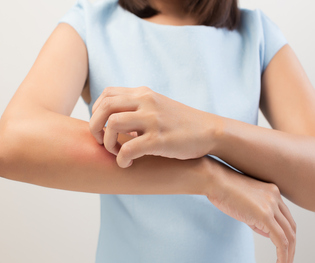For those suffering from eczema (aka atopic dermatitis), there can be overwhelming choices in available treatments. Between what is found over-the-counter to what is prescribed by a doctor, even wading through the options is disheartening as some may have side effects, or lack supportive research. Where does one start when seeking relief from eczema?
The itchy, red rash that develops on the skin often brings symptoms of pain and discomfort. Further, it can cause problems with sleep, emotional distress and affect daily living. For many, eczema may appear only in winter or other seasons, sometimes as an acute allergic skin reaction, while in others it is a chronic condition with no known cause. However, there are some promising treatments.
Pharmaceutical Options
Conventional treatments refer to therapies and treatments that have been scientifically researched by pharmaceutical companies, and are prescribed more often by allopathic doctors. These may include over-the-counter medicines, prescription medicines, targeted therapies, etc.
Two recently-approved new treatments seem promising for the inflammation associated with eczema. Crisaborole (trademarked as Eucrisa) is a nonsteroidal topical ointment and the first anti-inflammatory cream to be approved by the US FDA for the treatment of mild to moderate eczema in over 15 years. Another is a biologic therapy given by injection to adults who haven’t responded to, or can’t use topical medications. However, the outcomes have not always been consistent and long-term use of powerful immunosuppressive medicines is unsafe. As there is still no definitive cure for eczema, some people combine conventional treatments with natural alternatives.
Natural Health Options
There are several natural treatments commonly used for those seeking non-pharmaceutical eczema options. Although many individuals find relief in the following treatments, it’s important to remember that just because something is defined as natural, doesn’t mean it is safe for you. Always consult with a licensed health practitioner before trying any new treatments.
- Sunflower Seed Oil – Applied topically, it can aid in inflammation, itch, and improvement of skin barrier function.
- Coconut Oil – Currently being researched for its antibacterial effects against Staph bacteria. Most natural oils safe for the skin can help moisturize and relieve dryness.
- Massage – Aids in stress reduction.
- Acupuncture & Acupressure – Helps with pain and itching while decreasing stress.
- Vitamin D – Counters eczema flare-ups, especially in winter.
When the symptoms of eczema seem unbearable and uncomfortable, one seeks the best, personalized relief possible. Until the cause of one’s eczema can be discovered, perhaps a combination of treatment strategies is best at keeping eczema under control.









